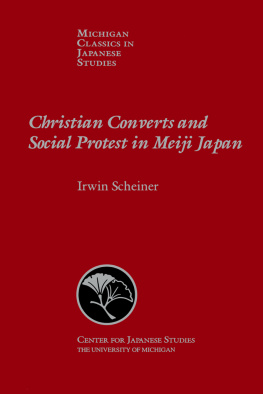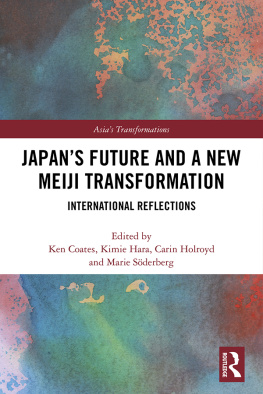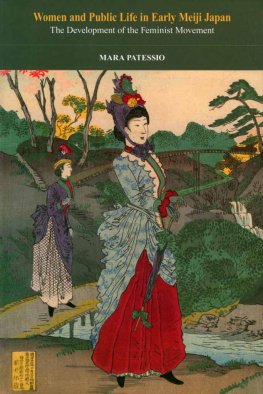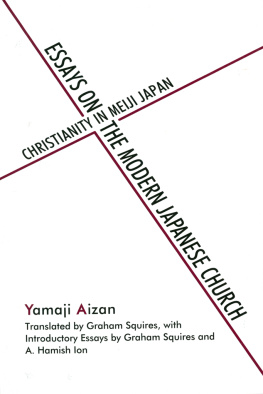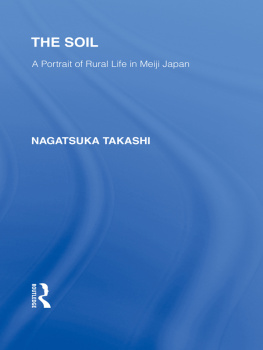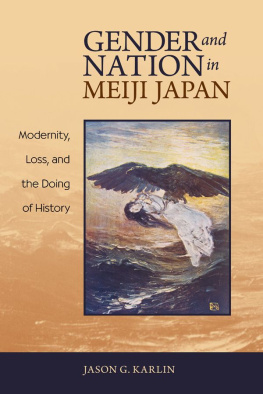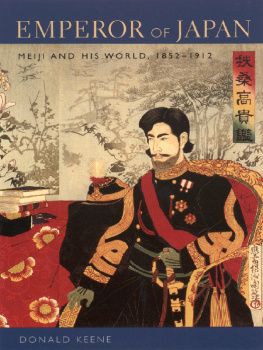Irwin Scheiner - Christian Converts and Social Protest in Meiji Japan
Here you can read online Irwin Scheiner - Christian Converts and Social Protest in Meiji Japan full text of the book (entire story) in english for free. Download pdf and epub, get meaning, cover and reviews about this ebook. year: 2020, publisher: University of Michigan Center for Japanese Studies, genre: Politics. Description of the work, (preface) as well as reviews are available. Best literature library LitArk.com created for fans of good reading and offers a wide selection of genres:
Romance novel
Science fiction
Adventure
Detective
Science
History
Home and family
Prose
Art
Politics
Computer
Non-fiction
Religion
Business
Children
Humor
Choose a favorite category and find really read worthwhile books. Enjoy immersion in the world of imagination, feel the emotions of the characters or learn something new for yourself, make an fascinating discovery.
- Book:Christian Converts and Social Protest in Meiji Japan
- Author:
- Publisher:University of Michigan Center for Japanese Studies
- Genre:
- Year:2020
- Rating:4 / 5
- Favourites:Add to favourites
- Your mark:
- 80
- 1
- 2
- 3
- 4
- 5
Christian Converts and Social Protest in Meiji Japan: summary, description and annotation
We offer to read an annotation, description, summary or preface (depends on what the author of the book "Christian Converts and Social Protest in Meiji Japan" wrote himself). If you haven't found the necessary information about the book — write in the comments, we will try to find it.
Christian Converts and Social Protest in Meiji Japan — read online for free the complete book (whole text) full work
Below is the text of the book, divided by pages. System saving the place of the last page read, allows you to conveniently read the book "Christian Converts and Social Protest in Meiji Japan" online for free, without having to search again every time where you left off. Put a bookmark, and you can go to the page where you finished reading at any time.
Font size:
Interval:
Bookmark:

CHRISTIAN CONVERTS AND SOCIAL PROTEST IN MEIJI JAPAN

CHRISTIAN CONVERTS AND SOCIAL PROTEST IN MEIJI JAPAN
IRWIN SCHEINER
CENTER FOR JAPANESE STUDIES
THE UNIVERSITY OF MICHIGAN
ANN ARBOR, MICHIGAN 2002
Copyright 1970 by the University of California Press
All rights reserved
Reprinted in 2002 with the permission of the author by the Center for Japanese Studies, The University of Michigan, 202 S. Thayer St., Ann Arbor, MI 48104-1608
MICHIGAN CLASSICS IN JAPANESE STUDIES NUMBER 24
Library of Congress Cataloging-in-Publication Data
Scheiner, Irwin.
Christian converts and social protest in Meiji Japan / Irwin Scheiner.
p.cm.(Michigan classics in Japanese studies ; no. 24)
Originally published: Berkeley : University of California Press, 1970.
Includes bibliographical references and index.
ISBN 1-929280-20-3 (paper : alk. paper)
1. Christian converts from ConfucianismJapan. 2. SamuraiReligious life. 3. JapanHistoryRestoration, 18531870. I. Title. II. Series.
BV2628.C65 S35 2002
305.6dc21
2002031291
The paper used in this publication meets the requirements of the ANSI/NISO Standard Z39.44-1992 (Permanence of Paper for Publications and Documents in Libraries and Archives).
Printed in the United States of America
ISBN 978-1-929280-20-9 (paper)
ISBN 978-0-472-12797-9 (ebook)
ISBN 978-0-472-90193-7 (open access)
Dedicated to the Memory of My Dear Friend Joseph R. Levenson
And when your sorrow is comforted (time soothes all sorrows) you will be content that you have known me. You will always be my friend. You will want to laugh with me. And you will sometimes open your window, so, for that pleasure... And your friends will be properly astonished to see you laughing as you look up at the sky! Then you will say to them, Yes, the stars always make me laugh! And they will think you are crazy. It will be a very shabby trick that I shall have played on you...
Antoine de Saint-Exupry, The Little Prince
CONTENTS
ACKNOWLEDGMENTS
Since beginning research on this book as a doctoral student at the University of Michigan, I have received generous financial support from the Ford Foundation as a Foreign Area Fellow, the University of Michigan as a Pre-doctoral Fellow, and the various institutes, particularly the Center for Japanese and Korean Studies, and administrative units of the University of California at Berkeley. I am deeply indebted to them all and would like to express my thanks at this time.
My debts to individuals are numerous. Friends at other universities, Paul Cohen, Peter Duus, Harry Harootunian and Tetsuo Najita have critically examined my manuscript and offered me their advice. I am particularly indebted to my friends at the University of California at Berkeley. I, like all of my colleagues in the history department, have been constantly heartened by the intellectual stimulation within the department and by its warm and concerned criticism. In particular, I would like to thank Richard M. Abrams, Robert Bellah, Delmer M. Brown, Gene A. Brucker, Gerald D. Feldman, Samuel Haber, Ira M. Lapidus, Lawrence W. Levine, George W. Stocking, Jr., and Frederic E. Wakeman.
Robert M. Middlekauff and Sheldon Rothblatt taught me more about the craft of the historian than I can ever hope to absorb, and I have been warmed by their friendship.
John W. Hall and Roger Hackett guided my dissertation and taught me much about Japanese history, as well as the task of the teacher.
My wifes aid can never be registered in any tangible terms. I can only thank her for the pleasure and joy our marriage has offered me.
Tokyo, 1969
I. S.
THE modern English social historian Noel Annan has suggested that for the present-day historian Rankes call for history wie es eigentlich gewesen should not be rendered as what actually happened, but what it was really like. The two translations are not differentiated by fact but by a distance in social-psychological feeling. Lord Annans reinterpretation of the classic canon on nineteenth-century historiography may also indicate that major lines of interpretation of European political, economic, and social development have been settled and that contemporary historians of the West may now give their time to the analysis of the psychological impact of the changes that have already been brilliantly described. Historians of Japan, like those of most of East Asia, have only begun to examine the political and social history of the classic past, and only recently have described the men and institutions engaged in Japans attempt to deal with modernization.
The excitement of what happened in the Meiji era, 18681912, the successes of economic development, and the enormity of the institutional changes have absorbed most present-day students of Japan in the story of development. As yet, Japanese history is mostly a tale of economic and social progress, and even when it is a study of unsuccessful political parties and arrested social movements, it amounts to a description of the amazing virtuosity of Japans adaptation to the necessities of a modern world. Nowhere has there been a discussion of the confusion necessarily generated by the rapidity of the change or of the agony created in the lives of many whose attitudes, expectations, and even successes depended on the continuance of now abolished institutions. Historians have ignored the settled conditions of most samurai and instead concentrated on the study of the minority of activist samurai leaders who, with the backing of only a few han (feudal domains) sought to overthrow the old order and whose success in doing so has made the study of the modernization of Japan the prime concern of historians. The history of the Meiji period may have been an over-all political and industrial success story, but for a fuller understanding of the conditions of that success it is also necessary to understand what it was really like for the members of the old elite to be estranged from the proponents of revolution and what many members did to assure their own social and psychological position in a world they had not expected.
For a long time, historians have recognized that the Restoration was not only a political but a profound social upheaval and that many attempts were made to adjust to it. The samurai-led Popular Rights movement was rooted in a combination of samurai dissatisfaction with their new role under the Meiji government and the conviction that Western liberal ideas should be used to guide the further development of modern Japan. There were leaders of the Restoration, too, who were dissatisfied with the direction of reform and appalled at the fate of the samurai because of new class-leveling legislation. Some, like Saigo Takamori, the most eminent samurai leader of the Restoration movement from Satsuma domain and a leading member of the oligarchy that ruled Japan in early Meiji, left the government and rose in rebellion. Within a decade of the Restoration, groups of former samurai had joined together to foment rebellion while others, seeking a more peaceful and modern way to show their opposition, had formed political associations based on Western ideas.
Historians and sociologists have demonstrated that a study of the Restoration must begin with an analysis of the social structure and values that enclosed and guided the samurai world. Not only did these values, as Robert Bellah has shown in his study of Tokugawa elite morality,the samurai derived his expectations and a sense of his identity.
Font size:
Interval:
Bookmark:
Similar books «Christian Converts and Social Protest in Meiji Japan»
Look at similar books to Christian Converts and Social Protest in Meiji Japan. We have selected literature similar in name and meaning in the hope of providing readers with more options to find new, interesting, not yet read works.
Discussion, reviews of the book Christian Converts and Social Protest in Meiji Japan and just readers' own opinions. Leave your comments, write what you think about the work, its meaning or the main characters. Specify what exactly you liked and what you didn't like, and why you think so.

